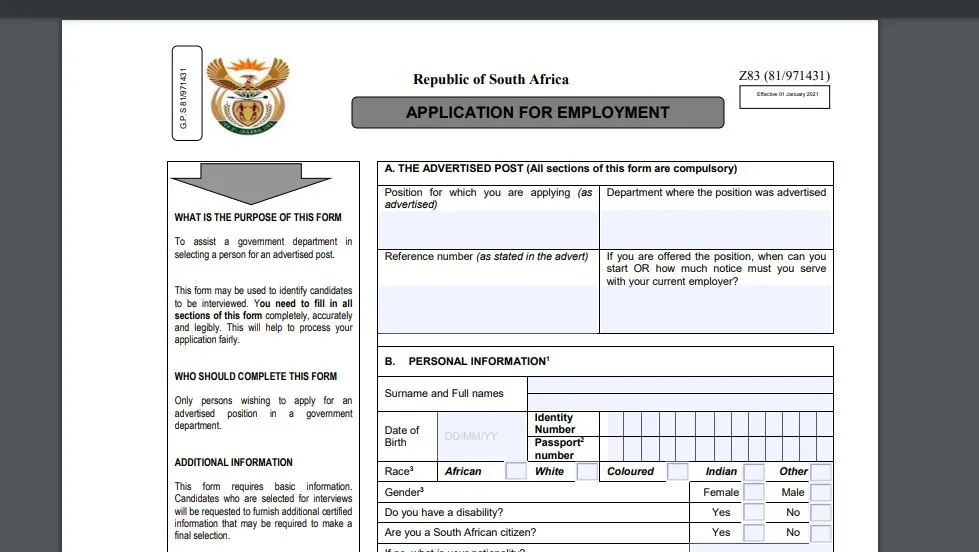
Government jobs offer a wide range of employment opportunities across various departments and sectors. These positions are advertised through different channels, including government websites, the Public Service Vacancy Circular, and the Vuk’uzenzele newspaper. In addition to job vacancies, government departments also offer learnerships and internships to provide valuable training and work experience to individuals.
Latest Government Jobs & Vacancies
To stay updated with the latest government vacancies and job opportunities, you can visit the websites of national government departments or access the Public Service Vacancy Circular. The Department of Public Service and Administration website provides a comprehensive listing of vacancies advertised by various government departments.
-

Track Master
PRASAJohannesburg, South Africa -

Intern: Labour Relations
Eastern Cape Department of Social DevelopmentMthatha, South Africa -

Intern:Strategic Planning – Bisho
Eastern Cape Department of Social DevelopmentEast London, South Africa -

Intern:Strategic Planning – Alfred Nzo: Mount Ayliff
Eastern Cape Department of Social DevelopmentEast London, South Africa -

Intern: Internal Control
Eastern Cape Department of Social DevelopmentFinance / Accounting / Audit, South Africa -

Intern: General Payment
Eastern Cape Department of Social DevelopmentFinance / Accounting / Audit, South Africa -

Intern: Salary Administration
Eastern Cape Department of Social DevelopmentGraduate Jobs, South Africa -

Intern: Fleet Management
Eastern Cape Department of Social DevelopmentGraduate Jobs, South Africa -

Assistant Director: Municipal Budget
Eastern Cape Provincial TreasuryFinance / Accounting / Audit, South Africa -

Director: Management Accounting
Eastern Cape Office of the PremierFinance / Accounting / Audit, South Africa -

Deputy Director: Human Resource Development
Eastern Cape Office of the PremierHuman Resources / HR, South Africa -

Senior Procurement Officer: Demand and Acquisition
Eastern Cape Office of the PremierProcurement / Store-keeping / Supply Chain, South Africa -

Stores Controller: Supply Chain Management
Eastern Cape Office of the PremierProcurement / Store-keeping / Supply Chain, South Africa -

Provisioning Administrative Officer: Logistics and Inventory
Eastern Cape Office of the PremierLogistics, South Africa -

Communication Officer-Government Marketing and Events
Eastern Cape Office of the PremierMedia / Advertising / Branding, South Africa -

User Support Technician
Eastern Cape Office of the PremierICT / Computer, South Africa -

Development Control Planner Intern at Nkangala District Municipality
Nkangala District Municipality, South Africa -

Senior Manager –Corporate Services
Molemole MunicipalityLaw / Legal, South Africa -

Commodities Specialist: ICT – FINA19241
City of EkurhulenieKurhuleni, Gauteng, South Africa -

Snr Manager: Operational Procurement – FINA19308
City of EkurhulenieKurhuleni, Gauteng, South Africa -

Snr Manager: Demand Planning & Enablement – FINA19234
City of EkurhulenieKurhuleni, Gauteng, South Africa -

Deputy Director: (Project Manager) Basic Education Employment Initiative
Eastern Cape Department of EducationProject Management, South Africa -

Data Caputrer: Basic Education Employment Initiative
Eastern Cape Department of EducationAdministration / Secretarial, South Africa -

Supply Chain Management Clerk
Department of Justice and Constitutional DevelopmentBloemfontein, South Africa -

Law Researcher
Department of Justice and Constitutional DevelopmentPretoria, South Africa -

Assistant Director: Logistical Management and Auxiliary Services
Eastern Cape Department of EducationLogistics, South Africa -

Library Assistant
Office of the Chief Justice South AfricaJohannesburg, South Africa -

Officer: Value Chain Support
Department of Small Business DevelopmentPretoria, South Africa -

Assistant Director: Demand & Acquisition Management – Bid Administration
Department of Small Business DevelopmentPretoria, South Africa -

Assistant Director: Economic Analysis and Econometrics
Department of Small Business DevelopmentPretoria, South Africa
Government Requirements and Eligibility
To be eligible for government vacancies, candidates must meet certain requirements. These requirements may vary depending on the specific job position and the department. Generally, the following criteria apply:
- Citizenship: Some government vacancies may require applicants must be South African citizens.
- Qualifications: Relevant educational qualifications and experience may be required for specific positions.
- Skills and Competencies: Candidates should possess the necessary skills and competencies as specified in the job advertisement.
For more detailed information about each vacancy, refer to the respective government department’s website.
Types of Job Vacancies in Government
Government departments offer a diverse range of job vacancies. Here are ten common types of job vacancies you can find in the government sector:
- Administrative Officer: Responsible for administrative tasks and supporting department operations.
- Project Manager: Manages and oversees projects within government departments.
- Financial Analyst: Analyzes financial data and provides insights for decision-making.
- Human Resources Officer: Handles HR functions, including recruitment, employee relations, and training.
- Communications Specialist: Develops and implements communication strategies for government departments.
- Legal Advisor: Provides legal advice and assistance to government departments.
- IT Specialist: Manages and maintains the IT infrastructure and systems within government departments.
- Social Worker: Provides social support and welfare services to individuals and communities.
- Environmental Officer: Monitors and manages environmental concerns and policies.
- Educator: Teaches in government schools or training institutions.
Each position has specific responsibilities and requirements. When applying for a government vacancy, carefully read the job description and ensure that your qualifications and experience align with the position.
How to Apply for Government Vacancies
To apply for government vacancies, follow these steps:
- Visit the website of the relevant government department or access the Public Service Vacancy Circular.
- Find the job advertisement for the desired position and carefully read the requirements and application instructions.
- Prepare a comprehensive curriculum vitae (CV) that highlights your qualifications, skills, and work experience.
- Complete the required application forms, such as the Z83 form, if specified in the advertisement.
- Gather any additional documents required, such as certified copies of qualifications and identity documents.
- Submit your application via the specified application method mentioned in the job advertisement. This can include online submissions, email, postal mail, or hand-delivery.
Ensure that you follow the application instructions provided in the vacancy advertisement. Failure to comply with the application requirements may result in disqualification.
Advantages of Working for the Government
Working for the government offers several advantages. Here are five benefits of being a government employee:
- Job Stability: Government positions often provide greater job stability compared to the private sector.
- Competitive Salaries and Benefits: Government jobs offer competitive salaries and comprehensive benefits packages.
- Career Growth Opportunities: Government departments provide opportunities for career development and advancement.
- Meaningful Work: Contributing to public service allows you to make a positive impact on society.
- Work-Life Balance: Many government positions offer favorable work-life balance arrangements, such as flexible working hours and generous leave provisions.
Government jobs can be rewarding and offer long-term career prospects. Consider these advantages when exploring employment opportunities in the government sector.
Government Learnerships & Internship Programs
Government departments also offer learnerships and internship programs to provide practical work experience and skills development to individuals. These programs are designed for both graduates and non-graduates, offering valuable learning opportunities in a real-world work environment.
If you’re interested in participating in a government learnership or internship program, visit the respective government department’s website or contact their Human Resources division for more information.
Preparing for a Government Job Interview
When preparing for a government job interview, consider the following tips:
- Research the Department: Familiarize yourself with the department’s functions, policies, and current initiatives.
- Review the Job Description: Understand the responsibilities and requirements of the specific position you applied for.
- Prepare Examples: Think of relevant examples from your past experiences that demonstrate your skills and qualifications.
- Dress Professionally: Dress appropriately for the interview to make a positive impression.
- Practice Interview Questions: Anticipate common interview questions and practice your responses.
By following these tips, you’ll be better prepared to showcase your abilities and suitability for the job during the government job interview process.
Statistics
Table 1: Employment in Formal Non-Agricultural Sector
| Quarter | Total Employment (in thousands) | Jobs Lost (March 2022 – March 2023) |
|---|---|---|
| Q1:2023 | 10,000 | 97,000 |
Analysis: The table presents the total employment in the formal non-agricultural sector during the first quarter of 2023, which is approximately 10 million. It also shows that there was a loss of 97,000 jobs between March 2022 and March 2023.
Table 2: Job Gains and Losses by Sector in Q1:2023
| Industry | Jobs Gained | Jobs Lost |
|---|---|---|
| Trade | – | 36,000 |
| Business Services | – | 32,000 |
| Transport | – | 2,000 |
| Construction | – | 2,000 |
| Community Services | 41,000 | – |
| Mining | 5,000 | – |
| Manufacturing | 4,000 | – |
| Electricity | 1,000 | – |
Analysis: This table showcases the job gains and losses in various sectors during the first quarter of 2023. The trade industry and business services sector experienced the highest job losses, with 36,000 and 32,000 jobs lost, respectively. However, the community services industry, mining industry, manufacturing industry, and electricity industry saw job gains.
Table 3: Employment Levels before and after the COVID-19 Pandemic
| Industry | Returned to Pre-pandemic Employment Levels |
|---|---|
| Business Services | No |
| Construction | No |
| Transport | No |
| Trade | No |
| Electricity | No |
Analysis: This table provides insights into employment levels in different industries before and after the COVID-19 pandemic. It shows that five out of eight industries, including business services, construction, transport, trade, and electricity, have not yet returned to pre-pandemic employment levels.
Table 4: Full-time Employment Changes in Q1:2023
| Industry | Jobs Lost | Year-on-Year Change |
|---|---|---|
| Business Services | 57,000 | – |
| Trade | 14,000 | – |
| Community Services | 5,000 | – |
| Transport | 3,000 | – |
Analysis: This table presents the changes in full-time employment during the first quarter of 2023. The business services industry experienced the highest number of job losses, followed by the trade industry. When comparing to the same period in the previous year, there was a decline of 24,000 jobs in full-time employment.
Table 5: Part-time Employment Changes in Q1:2023
| Industry | Jobs Gained | Jobs Lost | Year-on-Year Change |
|---|---|---|---|
| Community Services | 46,000 | – | – |
| Business Services | 25,000 | – | – |
| Transport | 1,000 | – | – |
Analysis: This table illustrates the changes in part-time employment during the first quarter of 2023. The community services industry showed the highest increase in part-time jobs, followed by the business services industry. However, the trade industry experienced a significant decline in part-time employment. When comparing to the same period in the previous year, there was a decline of 73,000 jobs in part-time employment.
Table 6: Total Gross Earnings in Q1:2023
| Industry | Gross Earnings (in billions of Rands) | Year-on-Year Change |
|---|---|---|
| Community Services | -13.5 | – |
| Trade | -12.4 | – |
| Manufacturing | -9.1 | – |
| Construction | -4.7 | – |
| Transport | -2.1 | – |
| Electricity | -1.0 | – |
| Business Services | 8.1 | – |
| Mining | 0.551 | – |
Analysis: This table presents the changes in total gross earnings in different industries during the first quarter of 2023. Several industries, including community services, trade, manufacturing, construction, transport, and electricity, reported significant decreases in total gross earnings. However, the business services industry and mining industry demonstrated increases. When comparing to the same period in the previous year, there was a year-on-year growth of R43.2 billion or 5.5% in total gross earnings.
Table 7: Basic Salary/Wages, Bonus, and Overtime Payments in Q1:2023
| Type | Basic Salary/Wages (in billions of Rands) | Bonus Payments (in billions of Rands) | Overtime Payments (in billions of Rands) |
|---|---|---|---|
| Decrease | -11.8 | -22.5 | – |
| Increase | – | 7.1 | 0.2 |
Analysis: This table provides an overview of the changes in basic salary/wages, bonus payments, and overtime payments during the first quarter of 2023. There was a decrease in basic salary/wages and bonus payments, while overtime payments saw a marginal increase. The business services industry reported an increase in bonus payments. When comparing to the same period in the previous year, basic salary/wages showed a year-on-year increase of R32.7 billion or 4.6%, while bonus payments exhibited growth of R7.7 billion or 13.0%. Overtime payments also showed significant year-on-year growth of R2.8 billion or 13.6%.
Please note that the “-” symbol indicates data that is not available in the provided information. data source: Statistics SA
Was this helpful?
22 / 6
#Administration #Application Forms #ARC #Departments #Documents #Education #Human Resource #Human Resources #Internships #Jobs & Vacancies #Learnership #Learnerships #Learning #Municipalities #National Government #Provincial Government #Vacancies